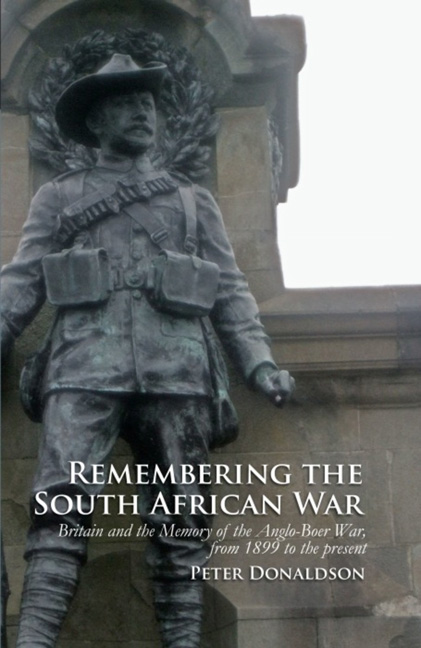 Remembering the South African War
Remembering the South African War Book contents
- Frontmatter
- Dedication
- Contents
- List of Illustrations
- Acknowledgements
- Introduction
- 1 Civic War Memorials: Public Pride and Private Grief
- 2 Pro Patria Mori: Remembering the Regiment
- 3 Vitai Lampada: Remembering the War in Schools
- 4 Alternative Affiliations: Remembering the War in Families, Workplaces and Places of Worship
- 5 Writing the Anglo-Boer War: Leo Amery, Frederick Maurice and the History of the South African War
- 6 Filming the War: Television, Kenneth Griffith and the Boer War
- Conclusion
- Bibliography
- Index
Conclusion
- Frontmatter
- Dedication
- Contents
- List of Illustrations
- Acknowledgements
- Introduction
- 1 Civic War Memorials: Public Pride and Private Grief
- 2 Pro Patria Mori: Remembering the Regiment
- 3 Vitai Lampada: Remembering the War in Schools
- 4 Alternative Affiliations: Remembering the War in Families, Workplaces and Places of Worship
- 5 Writing the Anglo-Boer War: Leo Amery, Frederick Maurice and the History of the South African War
- 6 Filming the War: Television, Kenneth Griffith and the Boer War
- Conclusion
- Bibliography
- Index
Summary
BY the end of the nineteenth century, Britain was a nation fascinated by the military world. Although, for some of the working class, this fascination may have been darkened by a lingering sense of apprehension, for the vast majority of the population the army served as a symbol for national and imperial pride. In part, the roots of this burgeoning popularity can be found in the Victorian cult of personality. Already well established by the time of Gordon's death in Khartoum in 1885, the focus on the individual hero reached new heights during the South African War as the new mass daily newspapers seized on it to market the conflict and increase sales. Yet, coeval with this development was a growing interest in, and idealisation of, the ordinary soldier. The popular image of Tommy Atkins, propagated through a variety of media, was of a stoic and increasingly abstemious imperial warrior sacrificing himself in the cause of a Christian mission. Steve Attridge has argued that such imagery became even more pressing during the early stages of the South African War when public confidence in the armed forces took a knock as news of the reverses at Stormberg, Magersfontein and Colenso filtered through. Representations of the ordinary soldier, which came to rival in popularity those of the officer, provided a romanticised vision of army life in which the enlisted man was idealised as the embodiment of Anglo-Saxon virtues. However, for this to work, the war itself had to be sanitised and reshaped into a traditional heroic narrative in which the subjugation of the Boers was a moral as well as military victory. This, of course, became increasingly difficult to do as the war entered into the drawn-out guerrilla stage.
These themes and challenges were reflected and crystallised in the war memorial movement that followed the cessation of hostilities in South Africa. While the individual hero was still central to much of the commemorative activity, especially where a community felt slighted by the perceived maltreatment of a local celebrity, there was a growing shift towards the memorialisation of the ordinary soldier.
- Type
- Chapter
- Information
- Remembering the South African WarBritain and the Memory of the Anglo-Boer War, from 1899 to the Present, pp. 170 - 174Publisher: Liverpool University PressPrint publication year: 2013


